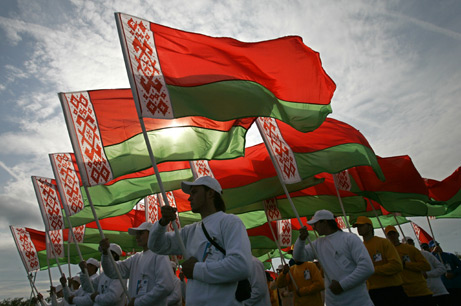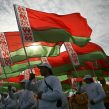
Reasserting Belarus’s Independent Voice
Publication: Eurasia Daily Monitor Volume: 12 Issue: 14
By:

Amidst the economic crisis in Russia and the ensuing devaluation of the Belarusian ruble, Belarus has been making increasingly notable attempts to voice its independent opinion on the world stage as well as improve its relations with the West. On January 13, Belarus lowered the price of its visas for citizens of the United States and the United Kingdom. Belarusian visas for children younger than 14 are now free. A one-time transit visa can also now be purchased for $25 and a short-term visa for $75. Each of the three previously cost $160 (Tut.by, January 15). “Let nobody worry, either here or in Russia, about the fact that Belarus will head persistently toward normalizing its relations with the European Union and the United States,” President Alyaksandr Lukashenka declared reassuringly, on January 15, at a session of Belarus’s House of Representatives (Belorusskie Novosti, January 15).
Just a week later, the Belarusian news portal Tut.by published a richly illustrated 19-page account of Scott Rauland’s impressions of Minsk and Belarus at large (Tut.by, January 21). Rauland serves as the chief US diplomat in Minsk. Although not a state-run institution, Tut.by would probably not release such a friendly account if US-Belarusian relations were not on the mend. In fact, in fall 2014, Rauland’s comments were published by Belta, the state-run press agency (Belta, September 16, 2014), and the same source has just posted a friendly report of his visit to Brest (Belta, January 17).
According to a veteran opposition pundit, Alyaksandr Klaskovski, a sword of Damocles hangs over the prospect of improving Belarus’s relations with the West, and this sword is held by Moscow. Indeed, Russia is extremely sensitive to any expression of Belarus’s independent voice. Illustratively, Gleb Pavlovsky, a former confidant of Vladimir Putin, suggests that soon Moscow-based propaganda will portray Lukashenka as a “fascist,” much like it has long been labeling the Ukrainian leadership (Slon.ru, December 25, 2014). Moreover, during a recent episode of the Moscow TV talk show Chto Delat? (What to Do?), anchored by Vitaly Tretyakov, a Kremlin-friendly pundit, three of that day’s five guests—well-known Russian political commentators—expressed concern about Belarus’s new Western leanings (Rossiya, January 19).
Such concern in Moscow is likely to be further fueled by Lukashenka’s newly issued appeals to his countrymen for greater use of the Belarusian language, which is still rarely heard in Minsk. “Culture is what makes a Belarusian a [true] Belarusian […]—not just our richest heritage, including literature, music, and architecture, but also language that we have to know, history we have to remember, and values that we have to respect,” President Lukashenka declared at the 42nd Congress of the Belarusian Republican Youth Organization (Belta, January 20). Soon thereafter, Belarus’s newly appointed minister of education, Mikhail Zhuravkov, suggested that history and geography at the college level should primarily be taught in Belarusian. Although, as Zhuravkov asserted, Belarusian should by no means be enforced, people in positions of power ought to set an example by switching to Belarusian and showing how beautiful this language is (Belorusskie Novosti, January 21). Until recently Lukashenka was routinely accused of being a major promoter of Russification inside Belarus. But he never agreed with that reproach, suggesting that the current language situation in Belarus developed before he came to power; a decisive Russification effort was actually made under the leadership of Piotr Masherau (1965–1980), the Communist Party secretary of what was then known as the Byelorussian Soviet Socialist Republic (Grigory Ioffe, “Reassessing Lukashenka” 2014, p. 251).
Today, the pendulum is swinging back. According to the December 2014 national survey by the Independent Institute for Socio-Economic and Political Studies (IISEPS), 58.4 percent of Belarusians would say “no” at a would-be referendum regarding their country’s unification with Russia. Three months earlier, 54.3 percent would have said “no,” whereas as recently as December 2007, the opponents of such unification accounted for just 31.6 percent (Belorusskie Novosti, January 17).
According to the Belarusian Institute for Strategic Studies, the innovation of the last quarter of 2014 was not just the intensification of Minsk’s contacts with Brussels, but also the fact that EU diplomats were briefed by Minsk about the Belarusian-Russian trade war, something that happened for the first time ever on December 11 (Tut.by, January 21).
Alongside the attempts to boost the Belarusian language and to improve the relations with the West, Belarus’s efforts to maintain good relations with Kyiv have been noteworthy. In his December 2014 interview to the editors of the annual volume Diplomatic Ukraine, the Belarusian ambassador to Kyiv, Valentin Velichko, said that “Belarus would never allow other countries to use Belarus’s territory for military intervention in Ukraine. We support Ukraine as an integral unitarian state along the lines of the acting constitution, which rules out federalization” (Tut.by, January 16). Velichko also acknowledged that Belarus would compensate the interest rate imposed by any Ukrainian bank that would issue a loan to buyers of Belarusian machinery.
A kind of thaw with the West is unfolding against the backdrop of Belarus’s ailing economy and the preparations for the 2015 presidential elections. One US dollar is currently worth 15,000 Belarusian rubles, which is almost 50 percent more than prior to December 19. During this author’s January 10–14 stay in Minsk, he observed Belarusians straining to obtain hard currency. In the morning hours, people lined up in front of banks in anticipation that somebody would bring in euros and dollars to purchase rubles. Banks would then turn around and sell all the foreign currency they just procured—but no more—so people looking to buy dollars or euros might end up having to stand in line for hours. As for the upcoming elections, several pundits predict that Lukashenka will exceedingly blame Russia for the economic problems. The last time he did that—in 2009—his popularity rating did not decline despite stoppages of all work at several factories. Conversely, during the financial crisis of 2011, when Belarusian authorities assumed the blame, trust in Lukashenka halved (Belorusskie Novosti, January 17).
In summary, the interplay between domestic developments and the country’s geopolitical leaning has long been a central issue in Belarus. This would hardly be the case if the country were not as relatively open as it actually is in terms of both dependency on international trade and in terms of social connections and labor migration. But the well-worn clichés and rhetoric about Belarus entirely fail to capture this dynamic.




